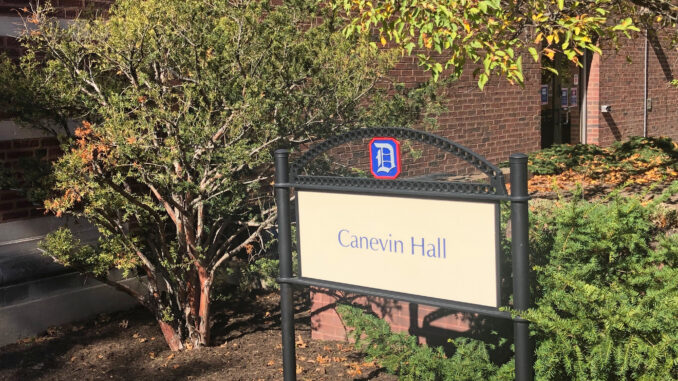
Kellen Stepler | Editor-in-Chief
11/5/2020
Gary Shank, the Duquesne education professor who was fired Oct. 7 for using a racial epithet in a Sept. 9 Zoom lecture during his Educational Psychology class, said Thursday that he “was terminated for making statements during [his] teaching that are well within the accepted standards of academic freedom.”
In a grievance filed Thursday, Nov. 5, Shank placed the grievance against Duquesne provost David Dausey, Duquesne President Ken Gormley, Gibbs Kanyango, interim department chair for the school of education and Gretchen Generett, interim dean of the school of education.
The resolution, sought by Shank, is pursuant to section 10.5 of the Faculty Handbook, claiming that tenured grievants who have been dismissed from university faculty may demand a hearing.
“Because I am tenured and my right to academic freedom has been violated, I demand an investigation, including a hearing, with said investigation and hearing being conducted by persons that are impartial, and have no pre-conceived ideas regarding the facts in issue,” Shank wrote.
Shank writes that if an impartial panel can not be assembled, he requests that a neutral, outside arbitrator conduct the hearing to be paid by the university. After the hearing, he demands a “full reinstatement with no conditions, back-pay and benefits, and payment and reimbursement of all my legal fees and expenses as a result of this wrongful termination.”
Shank also objects to section 10.6 of the handbook, which states that the grievant should bear the burden of proving there was a violation of policy, procedures or established practice.
“Because the university terminated me, Duquesne University should bear the burden to prove that I violated policy, procedures or established practice,” Shank wrote.
He cites a Sept. 27 letter from the American Association of University Professors (AAUP) written to Gormley, asking for Shank’s reinstatement.
Shank also objects to section 10.7 of the faculty handbook, denying him the right to an attorney, and that he demands the right to be represented by counsel.
“The refusal to allow me to be represented by counsel when my livelihood and tenured teaching position is at stake is a violation of due process and fundamental rights,” he wrote.
Duquesne spokesperson Gabe Welsch said that the university is aware Shank has filed a grievance within the University Grievance Committee for Faculty.
“This follows the process set forth in the University’s Faculty Handbook. The committee is made up of faculty from every school at the University and has the responsibility to hear and resolve grievances through an orderly and fair process. The University is committed to following this due process and respecting the work of the committee in every aspect as it moves forward. In the interest of allowing the committee to do its work diligently and without distraction, therefore, the University will not discuss the matter further at this time,” Welsch said.
In the grievance, Shank said that the Sept. 9 lecture dealt with “cultural visibility.” He claims that he was warning his students to not have a naïve perspective on things like racial slurs, and gave them a warning that they were going to look at the n-word in particular.
“I told them explicitly that this was for pedagogical reasons,” Shank wrote. “I also told them that I was going to use that particular term, and if they felt the need to use the term in our discussions then they had permission to do so.”
He wrote that it was done not to set up a “serious power imbalance between the class and himself,” and “in no way” did he encourage his students to use the term.
Shank wrote that in his lecture, he gave three examples of how the n-word was used in the 1950s.
“In using the word, I wanted my students to understand that the relatively casual manner in which these terms were used would in no way occur today,” he wrote. “I pointed out the banishment of these terms represented tangible progress, but we had a long way to go. I spent the rest of the period and the entire next class debriefing my students, listening to them and allowing them to speak.”
The reasons for using the actual term, and not an euphemism like “the n-word,” were two-fold, Shank wrote. The euphemism does not bear the full brunt of the word, and that his students – aspiring teachers – will need to “be able to connect with many different kinds of students and parents so they can start where they find them, to be able to guide them in more empathetic and effective ways.”
He writes that in the afternoon of Sept. 9, he talked to Kanyango and Generett about the class, his motives and intent, and his desire to debrief the students – in which Generett told Shank “not to worry.”
On Sept. 11, Generett told Shank that a student complained to the administration about the lecture, and received another call from Generett later in the afternoon that a video with “small portions of my lecture were posted out of context by a student on the social media platform Twitter,” and that he was on paid leave pending an investigation. Shank alleges that she told him that she could not talk to him anymore.
However, Shank said that Generett contacted him Sept. 14 to ask if he would be willing to participate in a Zoom interview with Ryan Dawson from Duquesne personnel the following day. Initially, Shank agreed, but withdrew from the meeting after advice from his attorney, Warner Mariani.
The following day, Dausey sent Shank an email and a letter via express mail asking for his resignation by noon Sept. 16, or that the university would begin to strip his tenure and start the dismissal process. Shank claims that he received the “actual letter” at 11:43 a.m. on Sept. 16, giving him 17 minutes to decide.
On Sept. 17, Shank received an email from the law firm of Reed Smith LLP on behalf of Duquesne, extending the deadline until 5 p.m. that day. Shank wrote he heard nothing from Dausey, Kenyango or Generett, and that rather than setting up a hearing “as required by Faculty Handbook Section 10.5,” on Oct. 5, he received an email and subsequent letter from Generett recommending his dismissal based on four charges of “serious misconduct.”
Generett’s charges, which Shank calls “overly broad, subjective and vague,” are that he failed to observe the Duquesne mission statement, failure to observe specific policies that address discrimination, a failure to treat students fairly, honestly and with respect and the failure to maintain standards of professional conduct articulated by administrative policies and in the faculty handbook.
He then received a letter from Dausey on Oct. 7 saying he was dismissed from the university. That letter, Shank said, did not address any of Generett’s recommendations for his termination.
Shank cites a Sept. 14 statement from the Faculty Senate Executive Committee that says the committee is “deeply concerned and disappointed by the recent actions involving a member of the faculty who utilized hurtful and racially insensitive words as part of a class session.” Shank says that the Faculty Senate has prejudiced him and that, therefore, any members of the committee who were involved in or consented to the issuance of the statement should recuse themselves from hearing his grievance.
Shank wrote that Dausey must recuse himself for being the person who terminated him, and Gormley and Generett must recuse themselves. He said that Generett’s predisposition was made evident in a Sept. 10 email to Shank, writing that “to be clear, I believe that there is never a time, pedagogical or otherwise, for a professor to use language that creates a hostile learning environment.” He claims that Generett’s comments in a Sept. 15 school of education leadership meeting also show that the “matter is a bother to her.”
“The public statements of respondents have not only violated my rights to academic freedom, in breach of the university’s policies and my contract of employment, but have defamed me and, unless they are promptly retracted and I am restored to my position, will injure my professional standing and reputation and cause me substantial financial harm,” Shank wrote.




